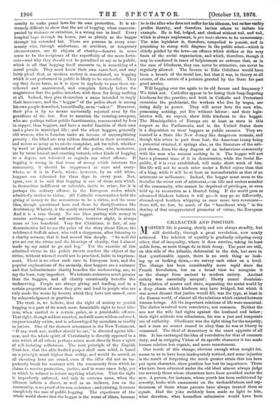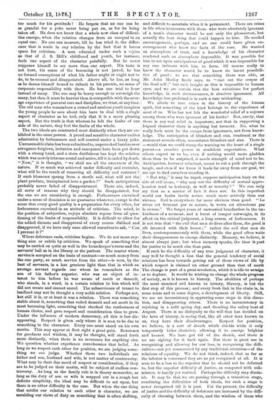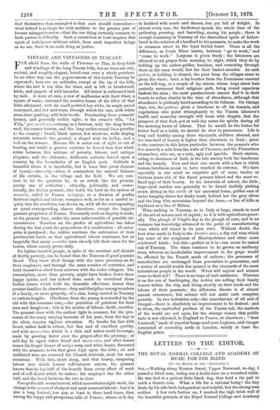CHARACTER AND POSITION.
1MODERN life is passing, slowly and not always steadily, but still decidedly, through a great revolution, now nearly achieved. The relation of equality is gradually eclipsing every other, that of inequality, where it does survive, taking its least noble form, as most things do in their decay. The poor are still, on this side of the Atlantic, deferential to the rich, but save in that questionable aspect, there is no such thing as look- ing up or looking down,—we survey each other on a level. The change has been considerably more rapid since the French Revolution, but on a broad view we recognise it as the change from ancient to modern society. Ancient society was essentially unequal ; liberty meant dominion. The relation of master and slave, separating the social world by a deep chasm which kindness may have bridged, but which it was never dreamt that justice would fill, was the type, at least in the Roman world, of almost all the relations which existed between human beings. All the important relations of life were =mutual. The duties involved were correlative, not common. Neither the son nor the wife had rights against the husband and father ; their right attitude was submission, his was a just and temperate use of authority. Obedience was the right thing for the majority, and a man no sooner ceased to obey than he was at liberty to command. The ideal of democracy is the exact opposite of all this. It has exchanged the idea of correlative for that of common duty, and in stripping Virtue of its specific character it has made human relation less organic, and more monotonous.
One result of this change, obvious enough when sought for, seems to us to have been inadequately noticed, and some injustice is the result of forgetting the much greater strain that has been put upon character, since position has lost its importance. Those who have been educated under the old ideal almost always judge too severely those whose characters have been moulded under the new. A person, for instance, whose youth has been embittered by severity, looks with amazement on the =thankfulness and cap- tiousness of those whose parents have always treated them as equals. Had the yoke suddenly been made so light to him, what devotion, what boundless submission would have been too much for his gratitude He forgets that no one can be as grateful for a yoke never being put on, as for its being taken off. He does not know that a whole new class of difficul- ties emerge, when the relation changes from an unequal to an equal one. No one can measure, till he has tried it, the differ- ence that is made in any relation by the fact that it leaves space for criticism. A man educated under such a regime as that of J. S. Mill's childhood and youth, for instance, feels one aspect of the character painfully. But he never supposes himself to see more than one aspect. His taste is not hurt, his sense of the becoming is not jarred, he has no formed conceptions of what his father ought or ought not to do, to be crossed and disappointed. Above all, he has, as long as he deems himself bound to submit to his parents, no sense of corporate responsibility with them. He has one trial to bear, instead of many. The one may be heavy enough to outweigh the many, but then it must be heavier than is compatible with the aver- age experience of parental care and discipline, we trust, at any time. The old man who remembers a cowed and anxious youth imagines the young people he sees about him have to deal with a single aspect of character as he had, only that it is a more pleasing aspect. But the truth is that whereas he felt the faults of one side of the nature, they feel the faults of the whole.
The two ideals are contrasted most distinctly when they are ex- hibited in the same person. A proud and sensitive character excites admiration by forbearance and self-control under a heavy yoke. Unreasonable claim has been submitted to, unprovoked harshness or arrogance forgiven, irritation and annoyance have been put down with a strong hand, and a stern dutifulness has kept the relation which was merely irksome sound and active, till it is ended by death. "Now," it is thought, "we shall see all the sweetness of the nature. If so much was achieved under difficulty and restraint, what will be the result of removing all difficulty and restraint ? If such blossoms sprang from a sterile soil, what will not the plant produce, transplanted into a garden ?" Such anticipations; probably never failed of disappointment. There are, indeed, all sorts of reasons why they should be disappointed, but I the one we are considering is enough. Forbearance exercised under a sense of dominion is no guarantee whatever, except in the sense that every good quality is a preparation for every other, for forbearance exercised in an attitude of criticism. The mind, in the position of subjection, enjoys absolute repose from all ques- tioning of the limits of responsibility. It is difficult to allow for the added distaste and disapproval of every course disliked and disapproved, if we have only once allowed ourselves to ask, "Can Iprevent it ?"
Where deference ends, criticism begins. We do not mean any- thing nice or subtle by criticism. We speak of something that may be carried on quite as well in the housekeeper's room and the servants' hall as in the library or the parlour. The master whose service is accepted on the basis of contract—so much money from the one party, so much service from the other—is seen, by the beat of servants, in a less gracious light than that in which an average servant regards one whom he remembers as the son of his father's superior, who was an object of in- terest to him before he was aware of merit or demerit, who stands, in a word, in a certain relation to him which will did not create and cannot annul. The subservience of tenant to landlord may not be thought a very noble relation. Perhaps not, but still it is, or at least it was a relation. There was something stable about it, something that veiled demerit and set merit in its most becoming light, something that checked the restlessness of human choice, and gave respect and consideration time to grow. Under the influence of modern democracy, all this is fast dis- appearing. Respect is given only where it is seen to be due to something in the character. Every one must stand on his own merits. This may appear at first sight a great gain. Reverence for goodness and wisdom, it may be thought, will stand forth more distinctly, when there is no reverence for anything else. We question whether experience corroborates that belief. As long as we respect each other for position, we are judging some- thing we can judge. Whether these two individuals are father and son, husband and wife, is not matter of controversy. What may be their due meed of respect or consideration, if they are to be judged on their merits, will be subject of endless con- troversy. As long as the family rule is in theory monarchic, as long as the duty of son or wife is mapped out in a rough but definite simplicity, the ideal may be difficult to act upon, but there is no other difficulty in the case. But when the one thing that settles our relation to each other is character, we are Moulding our views of duty on something that is often shifting, ,
■
and difficult to ascertain when it is permanent. There are crises in life when intercourse with those who were absolutely ignorant , of a man's character would be not only the pleasantest, but actually the best thing that could happen to him. He needed encouragement, perhaps, and no one could have given en- couragement who knew the facts of the case. He wanted an atmosphere of trust, and a knowledge of his character rendered such an atmosphere impossible. It was possible for him to act upon anticipations of good which it was impossible for any one intimate with him to form. Of course really to know the character would be to know its latent possibili- ties of good ; to see that something there was able, as Mr. John Morley finely says, to "cast out the corpse of the dead self ;" but such insight as this is impossible to human eyes, and we are certain that the best substitute for perfect knowledge, in such circumstances, is absolute ignorance. All knowledge less profound is in such a case misleading.
We allude to rare crises in the history of the human spirit, but something of the kind belongs to the- experience of most of us. Who has not felt the wonderful relief of a sojourn ■ among those who were ignorant of his faults? Not, surely, that
there is any real relief in imposture, not that in supporting a I feigned character there is anything but torment. No, what he really feels must be the escape from ignorance, not from know- ledge. The anticipation of blunders and sins, irrational as the statement sounds often, necessitates blunders and sins. There is —would that we could stamp the warning on the heart of a single parent—a creative power in confident expectation. What others expect us to be, even if nothing would more gladden them than to be surprised, it needs strength of mind not to be. Anticipation, however reluctant, seems to cut a path through the tangle, and even if we know it leads far away from our goal, we are apt to find ourselves treading it.
"But why," it may be urged, suppose anticipation busy on the side of evil alone, "why may not the difficulty of mutual appre- hension tend to leniency, as well as severity ? " We can only say that as a matter of fact it does not. In this imperfect world our faults invite notice much more actively than our virtues. Evil is everywhere far more obvious than good. "Le crime eat bruyant par sa nature, la vertu eat silencieuse par la sienne." We forget years of unwearied benefaction in the un- kindness of a moment, and a burst of temper outweighs, in its effect on the critical judgment, a long course of forbearance. It is not true that "the evil that men do lives after them, the good is
I oft interred with their bones ; " rather the evil that men do lives, contemporaneously with them, while the good often waits their disappearance to emerge distinctly. Memory, we believe, is almost always just ; but when memory speaks, the time is past for justice to be much else than pain.
If such be the difficulty of any true judgment of character, it may well be thought a loss that the general tendency of social relations has been towards getting rid of those views of life by which respect is claimed on other ground than that of merit The change is part of a great revolution, which it is idle to arraign or to deplore. It would be wishing to change the whole progress of society, as it is known to history. The abolition of perhaps the most unmixed evil known to history, Slavery, is but the first step of this process ; and every fresh link in the chain is, in some sense and to some degree, a development of liberty. Still, we see no inconsistency in approving some steps in this direc- tion, and disapproving others. There is no inconsistency in rejoicing in a mild spring day, and dreading the sultry heat of
August. There is no disloyalty to the will that has decided on the laws of history, in seeing that, like all other laws known to us, they have their disadvantages. Respect for position, we believe, is a sort of sheath which shields while it only temporarily hides character, allowing it to emerge brighter and keener. We have got rid of the sheath, and there is no use sighing for it back again. But there is great use in recognisiug and allowing for our loss, in recognising the diffi- culties—not yet consecrated by any traditional attention—of the relations of equality. We do not think, indeed, that as far as the inferior is concerned they are as yet recognised at alL It is seen to be a loss to the superior that he should not be deferred to, but the superior difficulty of justice, as compared with sub- mission, is hardly yet realised. Perhaps the difficulty may dimin- ish. It may be that we are passing through a transition stage, combining the difficulties of both ideals, for such a stage is never recognised till it is put. For the present, the difficulty
of justice and the difficulty of deference are increased by the diffi- culty of choosing between them, and the wisdom of those who
find themselves thus entangled is that each should remember— what indeed is perhaps the only antidote to the greater part of human misapprehension—that the one thing certainly common to both parties is difficulty. Such a conviction at least inspires that spirit of indulgence without which, from such imperfect beings as we are, there is no such thing as justice.




































 Previous page
Previous page